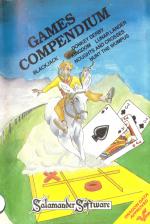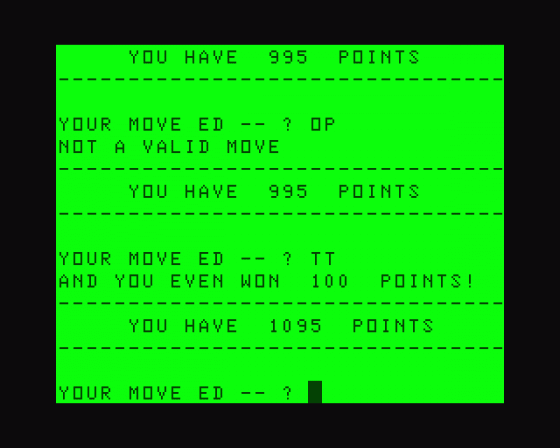
Dragon User
 1st May 1983
1st May 1983
Categories: Review: Software
Author: John Scriven
Publisher: Salamander
Machine: Dragon 32
Published in Dragon User #001
Fighting Samurai and spaceships, manipulating databases and synthesising speech - John Scriven finds software that will push the Dragon to its limits once arcade games have lost their thrill
Introduction
Fighting Samurai and spaceships, manipulating databases and synthesising speech - John Scriven finds software that will push the Dragon to its limits once arcade games have lost their thrill
When the Dragon appeared last summer, it was encouraging to see the Dragon Data was launching software at the same time. All too often, manufacturers produce good hardware but neglect the software side, forgetting that machines that are sold with games potential will not be bought unless the games are available.
Indeed, computers sell to a large degree on the software support available. Since those early days many more programs have become available, and it is interesting to see what progress has been made since then.
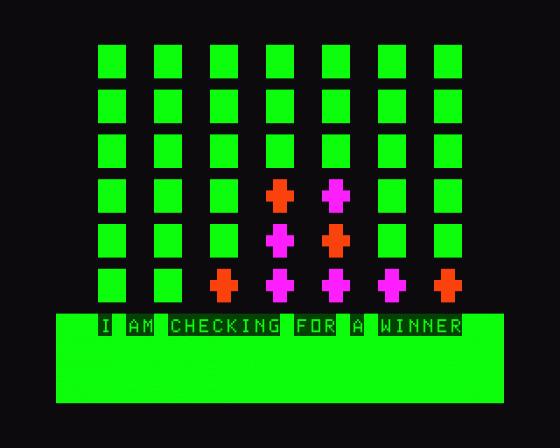
Software for the Dragon is available in two forms - Rom cartridges that plug into the side and cassettes that have to be loaded via a cassette player. The material available on cartridge consists mainly of arcade type games. As they are written in machine code, they are fast and some incorporate modifications that make them more fun than the originals.
When you purchase any software, check up to see if you need joysticks. The packaging does not always make this clear, and they are often essential. There are several models on the market of varying quality and price, so if you have not yet acquired a set, it is wise to shop around.
Rom Cartridge
First of all, the Dragon Data cartridges. Meteoroids is a version of Asteroids, with a few advantages over similar games. It is possible to select the skill level from 0 to 15. It is also possible to use 1, 2 or even no joysticks. Controlling the errant spacecraft is fairly difficult until you realise that Newton's laws of gravity are obeyed rather well, and take this into account. Once you learn to cope with this, it is a lot of fun.
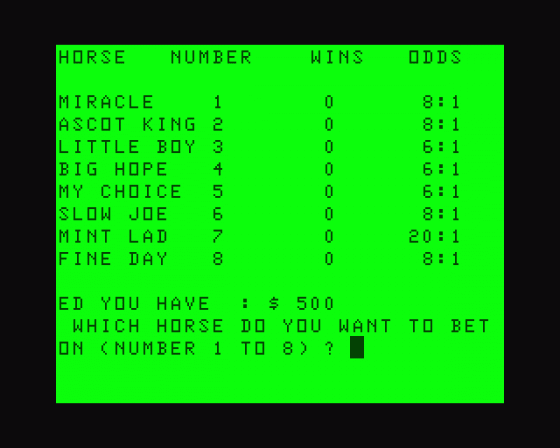
The object is to destroy as many meteoroids as possible before you fall foul of the flying saucers, which are too accurate for comfort. Individual and best scores are shown in a league table. Unfortunately, the display is in black and white in order to use the highest resolution, but this is inherent in the machine and a problem that occurs in many games.
Cosmic Invaders is a rather weak version of the old favourite Space Invaders and is somewhat lacking in sparkle. Anyone who has played the originai would soon tire of this cartridge. It is fairly easy to master, and once you discover how to beat it, even the prospect of a high score fails to excite.
Starship Chameleon can be played by one or two players and involves destroying enemy rockets by colliding your own craft with them. The interesting difference is that craft are colour-coded according to whether they are made of matter or anti-matter. If your craft has the wrong matter status (selected with the "fire" button on the joystick) then you will explode. Red missiles that are smart, home in on you, adding to the challenge of the game. Skill levels from 1 to 9 may be selected and the scores are shown on the screen.

My one criticism of this game is that the background colour is the emetic green that Dragons produce, and with all the high-speed movement on screen you could end up the same colour. On a more serious level, this is more original than Cosmic Invaders, and to my mind, offers much more of a challenge.
There are two cartridges that involve chasing round mazes, although Dragon Data has avoided calling either of them "Taff-man".
Cave Hunter presents you with a cave maze, always the same, with four bars of gold at the base. The intrepid pot-holer has to collect them one at a time and deposit them just outside the entrance. Nothing could be that simple, however - lurking in the cave are unpleasant creatures who devour you when they catch up with you, unless you've recently passed over a power pack, when you have a few seconds to turn the tables on them. This game is fast-moving, entertaining, and more difficult than it at first appears.
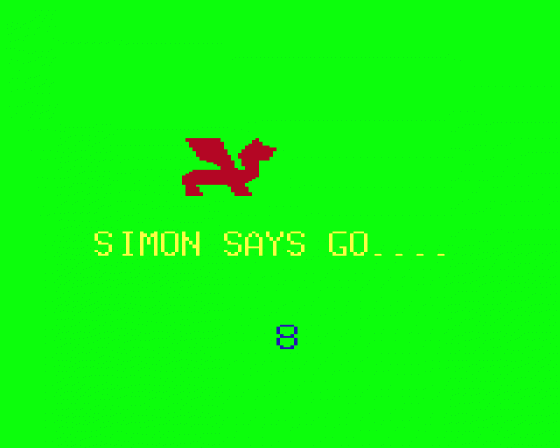
Ghost Attack is rather more familiar in design. The object here is to gobble up proton pills littering a maze white avoiding the attentions of three ghosts (unless you've recently passed over an "energiser"). There are three levels of difficulty - "easy', "hard" and "tuff". This game is fun to play but for some undisclosed reason is more expensive than the other cartridges.
Berserk, the last of the Dragon Data cartridges, is based on a popular arcade game that is not often translated to the home computer format. This is another game where colour has had to be sacrificed for high resolution. You control a small man who must be steered through a series of inter-connecting rooms. Robots inhabit the maze and you have to shoot them before they zap you. The walls are electrified, as are the robots, so steady hands are necessary.
As you move off the edge of the screen, another series of rooms appears. It is important to resist the attentions of a lethal bouncing ball called 'Evil Orville'. He cannot be destroyed and tends to move faster than you can. This is a well-written game and makes good use of the graphics of the Dragon.
Cassette Games

The cassettes from Dragon Data cover a wide range of activities and demonstrate the many possible uses for a home computer when arcade games lose their thrill. They are considerably cheaper than cartridges, but naturally take much longer to load and leave you at the mercy of a sometimes unkind cassette Operating System.
If you've used your Dragon for some time, then you've probably discovered that once the correct level has been set, you have no trouble with your own cassettes - but those recorded on other machines can be temperamental.
Dragon Special Selection 1 contains four simple games that tax the parts that arcade games do not reach, namely memory and intellectual skills rather than well co-ordinated hand-eye movements. Brain selects two characters from the keyboard and gives you clues as you attempt to guess them. Four is a version of Connect Four, which is itself a larger version of noughts and crosses. Horse is a gambling game (in which the compuler cheats - I'm sure it does!). Simon is the familiar colour/sound memory garme. This tape is good value and even invites you to list the programs in order to discover how the various effects are achieved, so can be used to learn more about the workings of your Dragon.
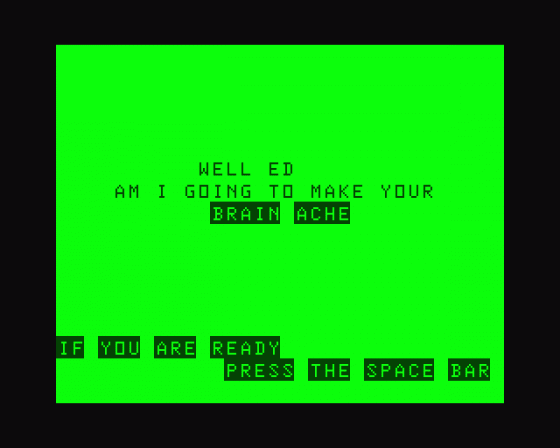
Graphic Animator uses joysticks to design shapes and pictures on the screen. There is an option to save several pages of graphics and to flick them through quickly to produce an animated effect. This is an interesting cassette, but needs practice to control the movements.
Personal Finance contains three home management programs, Family Budget, Family Accounts and Family Address. The names are self-explanatory, and the programs utilise the excellent file-handling capabilities of the Dragon. Once the main program is in memory, different files can be selected, sorted, changed, deleted, etc, and the new version stored for later use. The documentation, as with all Dragon Data software, is clear and well-written, and the tape is good value if you want to exploit the serious side of your Dragon.
Special Selection 2 also uses the file system to manipulate a database. This program is better than some costing twice as much - even without considering the other programs. It allows you to set up your own database and to put the entries in order, not just in the first fields but in all the others. This means that if you used the system to store names, addresses and telephone numbers, you could sort the file into alphabetical order of names or addresses or even in the order of the phone numbers.
Of the other programs. Music uses the screen as a sheet of manuscript upon which notes may be written. The tune can be played after completion and stored on tape if you fancy your chances with a new Eurovision song winner. The version of Hangman is extremely feeble - drawing a large Dragon is no substitute for the gallows!
Computavoice is very good value. It allows you to output speech from your television. This has to be entered carefully using phonemes, or sound blocks. If you enter the words as they are spelt, the result is awful, but if you experiment with the instruction book in hand, it is quite simple to make your Dragon offer a friendly word of advice during a game. Longer phrases are possible, but I confess it was two days' work before it said: "Brain the size of a planet and I end up here!" The quality could not be considered anything more than rudimentary, but as an introduction to speech synthesis is has to be good value.
Quest is a cross between Adventure and Kingdom. The aim is simple - to traverse a patch of unpleasant country and invade Moorlock's Citadel. Achieving this aim is considerably more difficult. You need to equip yourself at various markets with men and tools as your progress is slowly revealed on a map of the terrain. My verdict is entertaining - but difficult.
Madness And The Minotaur is in the mould of traditional text adventures. The challenge is to seek treasure in a labyrinth of passages and bring it to the surface. Inhabiting the many rooms are both friendly and unfriendly creatures. Exploring the many locations and learning the different spells is a time-consuming business, but if you enjoy this sort of game, you will not be disappointed with this version.
To The Limits
There are now many firms apart from Dragon itself which are offering software. In some cases it is not of a particularly high standard - in others it pushes the Dragon almost to its limits. There appear to be more cassettes on the market than cartridges, so that is where I shall concentrate.
Games Compendium from Salamander Software contains six games. Donkey Derby is similar in concept to Horse on a previous Dragon Data cassette, but has more entertaining graphics. If your steed falls, it lies there with its feet in the air! The game also allowed me to win much more than in real iife. The second game, Kingdom, is a management simulation of ruling a country. I did not get on as well as on the BBC demonstration tape version, but this probably says more about my skill in governing than the quality of the program.
Blackjack is the American form of Pontoon, a card game where you try to get a hand worth 21 points. The graphics are reasonable, and the game seems fair, i.e. I didn't feel the computer cheated all the time! Hunt the Wumpus is such an old computer game, it probably has its origins in valve-driven mainframes. You need to explore a cave system seeking this strange animal, the Wumpus. The computer will tell you if you are getting cbse and you may fire crooked arrows into the cavern that is his lair. If it's the wrong cave, you may get the arrow on the rebound; if you stumble into his cave, you are eaten - with mustard! Not as addictive as an adventure game, but stiil a pleasant diversion.
The cassette also contains Noughts And Crosses and Lunar Lander (joystick required). Although no new frontiers are crossed, the cassette is competently written, reasonably documented, and fairly idiot-proof. As with all Salamander software, the cassette comes in a little library case similar lo a video cassette holder. For a selection of games, it is good.
Another offering from Salamander is Golf. The simulation is as close as the Dragon will allow and includes such features as choice of club and strength of shot. The course is shown on a plan, with the various features colour-coded so as to help in choosing options. Just to help the atmosphere (and destroy your nerve) there are additional bits of reality, such as bunkers, trees, wind velocity and direction that tend to interfere with your game.
The graphics are adequate, and this version compares well with others on the market. I think I still prefer the outdoors version, but Salamander's version would do well on rainy days. (I still miss the nineteenth hole.)
Hangman is one of those perennials that is easy to adapt for the computer and that software houses issue when they can't think of anything better to do - at least usually. Super Hangman from Salamander seems to have had some thought and effort put into it. There are three skill levels depending on how much help you want and a vocabulary which won't be quickly exhausted (the computer has a thousand words stored in its memory).
More than that the high resolution man whose life depends on your skill is convincingly done and a timer ticks away the last seconds of his life as you try to win him a reprieve. All in all, if you haven't got it already this looks to be the version to go for.
Lothlorien produces a game called Samurai Warrior. This is similar to Kingdom, as it is a game where various choices are available to you, and the outcome depends partly on wise choice and partly on luck. The location is old Japan, and you are among a band of Samurai hoping to achieve a good score. This can be obtained through fighting other Samurai, defending helpless villagers, or by commiting Seppuku (the Japanese word for ritual self-sacrifice).
Although the concept is a trifle gory, the game is interesting and well thought out. There are some graphics - Samurai versus bandits, for example, but it isn't as exciting as a Kurasawa movie. I enjoyed the novelty of the game, however, and it certainly made a pleasant change from run-of-the-mill settings of most games.
It is fairly clear to anyone entering a store like W H Smiths that the quality of software packaging is improving all the time. Although this is pleasing to the eye, the contents do not always live up to the expectations conjured up by the superb artwork. It is also true that some excellent programs slip by unnoticed when they are concealed in simple covers.
Microdeal is a case in point. Some of its software is beautifully packaged but proves disappointing, while the least flashy conceals originality. Alcatraz II shows a fugitive from a Minotaur on the cover, but in order to reach this stage you must negotiate prison guards and lasers. This sounds quite inviting until you realise that the game uses low-resolution graphics and, being written in Basic, does not have the speed of a machine-code program.
The concept of the game is interesting but the result is merely average. From the spelling and the fact that the instructions are in a short separate program, it seems possible that Alcatraz II was designed for use with the Tandy Colour Computer.
Planet Invasion, again Microdeal's, has a gaudy sleeve. This time, the book can be judged from its cover , as this game is a competent version of Defender, complete with smart bombs and high-speed machine-code action. The scene is set rather differently, in that "caloxin crystals" rather than small people are being lifted from the surface of the planet, but the rest of the game should satisfy any Defender addict who wishes to play at home. This game originates in the United States, according to the copyright information.
Microdeal's Ultimate Adventure 4 comes in a rather plain cover but inside lurks an entertaining adventure. The locations leap from Arctic wastes to jungle with incredible rapidity, but the program was written by someone wrth a sense of humour, and is reasonable for a text-onty game. It is written in Basic, but this is fast enough for this type of program. My only serious quibble would be with the atrocious spelling - I counted eight mistakes in the instructions alone ("obsticals" being one of the more amusing!). This is a high number for a finished product and spoils an onginal game.
Donkey King is the fast from Microdeal and is a "Dragonised" version of an American original written for the Tandy by Tom Mix. The cassette contains not one but three versions of the arcade game whose name differs only in one vowel. True enough the only difference is that of the background/foreground colours but if you choose black and white the resolution is noticeably higher.
When it comes to reviewing straight arcade copies the main criterion must be "How good is this version?". This one lacks the caged gorilla threateningly shaking the bars but does have fireballs and a helplessly screaming Fay Wray.
Despite a practice option I failed to rescue the girl and was regularly crushed to death by barrels and/or fireballs. Written in machine code, the game is fast enough to be addictive and I found that one humiliating failure was quickly followed by another as my finger, acting against my better judgement, insisted on another go.
Forbidden City is an adventure game from Apex Trading of Brighton. The object, as always, is to amass as much treasure as possible without falling foul of the unpleasant things that lurk within the walls of a city. As adventure games go, I was not particularly impressed. It is purely textual, which means that the descriptions have to be inspihng, amusing or original and here they are barely adequate. It is fun to play. but not really in the addictive class.
Cassette 2 is the uninspiring title of a collection of games from Video Productions. The tape seems to be good value in that it contains an index as well as six programs. They are, however, very short, and the graphics are the feeblest possible. With the potential of the Dragon for excellent displays, one wonders why programs should be produced using maths symbols to represent spacecraft. This gives the games the feel of something written for the ZX81! Luckily, the programs improve slightly towards the end of the cassette. Although they are fairly idiot-proof, most users could write comparable games - so why buy this cassette?
Games Pack 2 (Gem Software)
Games Pack 2, from Gem Software, contains four games. This collection is far more varied than the last and is far better value. The first game is a flight simulator that enables you to attempt a landing provided you have a pair of joysticks. "Attempt" is the operative word as it is not an easy task. There are no graphics, and the instrumentation is rudimentary, but it is unusual to find so challenging a game amongst a collection.
Hangman, the second program, is a reasonable version with the words stored in data lines, so the program could be altered to contain your own words in a classroom or at home. This is a lot better than the Dragon Data version. The third game is called Speed Boat, the object of which is to race down a river bursting balloons: nothing out of the ordinary, but quite entertaining.
Ships, the last in the pack, is a version of the co-ordinate guessing game, battleships. You have to discover the position of the computer's hidden ships, and if you are successful, there is a display of the unfortunate ship being hit. My criticism of this game is that the co-ordiinates have their origin in the top feft-hand corner, and the "y" value has to be entered before the "x" co-ordinate, which goes against the accepted conventions. Apart from this, it is an exciting game, and completes a tape that represents good value for money.
Other Games
To complete this selection, there is a financial cassette from Hilton Personal Computer Services - Personal Banking System. This cassette contains enough functions to allow you to check on your own bank account. It is menu-driven and can support separate data files. It copes with standing orders and corrections to entries as well as printing statements which you can compare with the bank's.
It could be used by a small business to check individual accounts, but this might be risky - I managed to crash the program twice by entering values outside the permissible range. A program with any business potential would not have allowed me to do this.
To sum up, it seems that there is still room for innovative software on the Dragon. Six months ago. Dragon Data released its first batch of programs, and this is still able to hold its head up in the software marketplace. Of the cassettes and cartridges reviewed here, there seems to be a tendency towards over-charging for products that rarely rise above mediocrity. If the quality of software is not improved, more people will write their own. Ultimately, of course, this would not be a bad thing.

